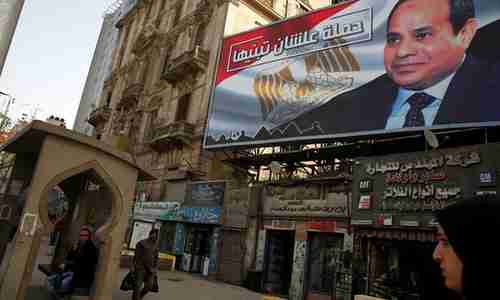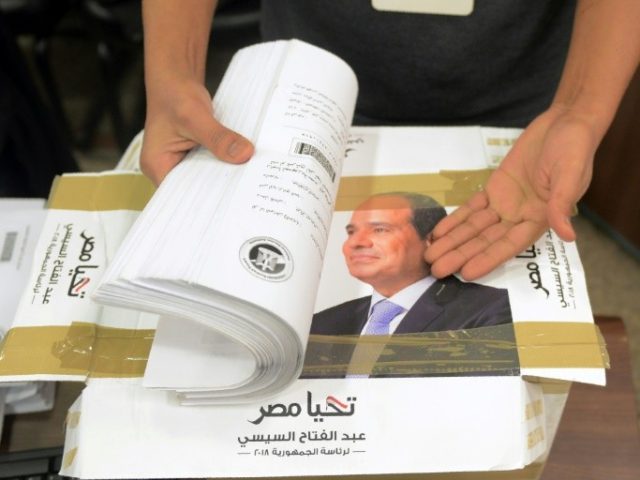This morning’s key headlines from GenerationalDynamics.com
- Egypt’s presidential election becomes a farce as opposition candidates are forced out
- Tensions rise between Egypt and Ethiopia over Nile River dam
Egypt’s presidential election becomes a farce as opposition candidates are forced out

Outsized election poster of al-Sisi in Cairo (Reuters)
Egypt’s presidential election, to be held on March 26-28, is looking more and more like a farce, as opponents of the current president Abdel Fattah al-Sisi are being forced to withdraw, one after the other. It may be that al-Sisi will be the only person left on the ballot.
Sami Anan, a retired army Chief of Staff and a former member of Egypt’s Supreme Council of Armed Forces, was arrested on Tuesday, two days after announcing that he would run for president. He was dragged from his car on Tuesday morning and taken before a military court. He has not been seen since.
Anan was arrested on the charge of announcing that he would run for president. This was a violation of the law, according to authorities, because Anan was affiliated with the armed forces. He is also charged with inciting a rift between the Armed Forces and the Egyptian public. Officials said that he was “summoned for interrogation in front of specialized personnel” for his crimes. Needless to say, Anan’s candidacy has been withdrawn.
That is the way this election is going. The presidential election will take place on March 26-28, and al-Sisi, who was himself the former chief of Egypt’s armed forces, recently announced that he will run for re-election. But magically, one after another, al-Sisi’s potential opponents are being forced to withdraw.
On November 29 of last year, Colonel Ahmed Konsowa announces his plans to run for president, but three days later he was arrested, and convicted of “expressing political opinions as a serving military officer.”
Mohammed Anwar al-Sadat is the nephew of the former Egyptian president Anwar al-Sadat, who was assassinated in October 1981, by extremists who blamed him for signing a peace deal with Israel.
Mohammed Anwar al-Sadat had planned to run for president, but dropped out last week because his campaign staff was being threatened. According to al-Sadat:
The logic says the regime should allow two or three or four people to run against Sisi to make it look legitimate. But it seems like they don’t even care about how it looks anymore.
Left-wing rights lawyer Khaled Ali said that he would run on November 6 of last year. He was arrested for making “an obscene gesture” outside a Cairo court. Several members of his campaign were arrested on various charges. Anan’s arrest on Tuesday was apparently the last straw, as Ali withdrew on Wednesday. According to a supporter,
[T]here was a widespread feeling that we won’t be given a chance to compete.
Anan’s arrest in this rough manner added [to] the impression that this regime wants a referendum, not competitive elections. We wanted a true competition. We didn’t want to take part in a play or provide material for the regime to claim these are genuine elections.
There is still one major contender opposing al-Sisi. Mortada Mansour, an MP more right-wing than al-Sisi, announced his bid on January 13, and has until January 29 to get 25,000 nomination signatures, with a minimum of 1,000 each from 15 of Egypt’s 29 provinces. Mansour announced that his first act as president would be to ban access to Facebook.
The Sadat, Ali, and Anan campaigns say that they routinely experienced interference or intimidation. Al-Sisi’s reelection seems assured, as dissent has been crushed, and all three were forced to withdraw, showing what a farce the election is becoming. Africa News and Guardian (London) and Telegraph (London)
Related Articles
- Egypt in state of emergency after terrorist attack in Sinai (26-Oct-2014)
- Generational Dynamics analysis of the crisis in Egypt (28-Jul-2013)
- Egypt’s army deposes Morsi in a non-coup coup (04-Jul-2013)
Tensions rise between Egypt and Ethiopia over Nile River dam
Egypt’s president Abdel-Fattah al-Sisi says that he does not want war with Ethiopia and Sudan, but tensions are rising nonetheless over the Grand Ethiopian Renaissance Dam (GERD) that Ethiopia is constructing on the Blue Nile river.
In a televised broadcast last week, al-Sisi said:
We are not prepared to go to war against our brethren or anyone else for that matter. I am saying this as a clear message to our brothers in Sudan and Ethiopia.
Egypt neither conspires nor meddles in anyone’s internal affairs. We are determined to have good relations [with Sudan and Ethiopia]. Our region has seen enough the past few years.
Nonetheless, one does not declare that he does not want to go to war unless he is actually thinking about going to war.
Ethiopia’s $5 billion GERD project is soon to be completed and will be the largest hydroelectric dam project in Africa. Ethiopia says that the GERD will provide power to millions of people in desperate need of electric power, and it sees GERD as a means of overcoming poverty.
However, it will also reduce the flow of water downstream to Egypt. Egypt depends on the Nile river to supply most of Egypt’s drinking war, to irrigate the Nile Delta, and to generate half of the country’s electricity through the operation of Egypt’s Aswan High Dam.
The GERD dispute is becoming a part of the larger regional dispute related to the blockade of Qatar by Saudi Arabia, United Arab Emirates (UAE), and Egypt.
Turkey, which backs Qatar, has a relationship with Sudan and Somalia, while Ethiopia and Sudan have a strategic alliance. Egypt’s and Eritrea’s leaders met recently to discuss mutual interests.
It seems unlikely that Egypt and Ethiopia will go to war, but the chances of war could increase as the GERD project nears completion. VOA and Al Jazeera and Egypt Independent
Related Articles
- Egypt accused of ‘dirty deal’ to sabotage an Ethiopian dam project (05-Feb-2017)
- With Egypt’s contraceptive shortage, Cairo becomes the world’s fastest growing city (24-Mar-2017)
KEYS: Generational Dynamics, Egypt, Abdel Fattah al-Sisi, Ethiopia, Sami Anan, Ahmed Konsowa, Anwar al-Sadat, Mohammed Anwar al-Sadat, Khaled Ali, Mortada Mansour, Blue Nile, Ethiopia, Grand Ethiopian Renaissance Dam, GERD, Aswan High Dam, Saudi Arabia, United Arab Emirates, UAE, Turkey, Qatar, Sudan
Permanent web link to this article
Receive daily World View columns by e-mail

COMMENTS
Please let us know if you're having issues with commenting.